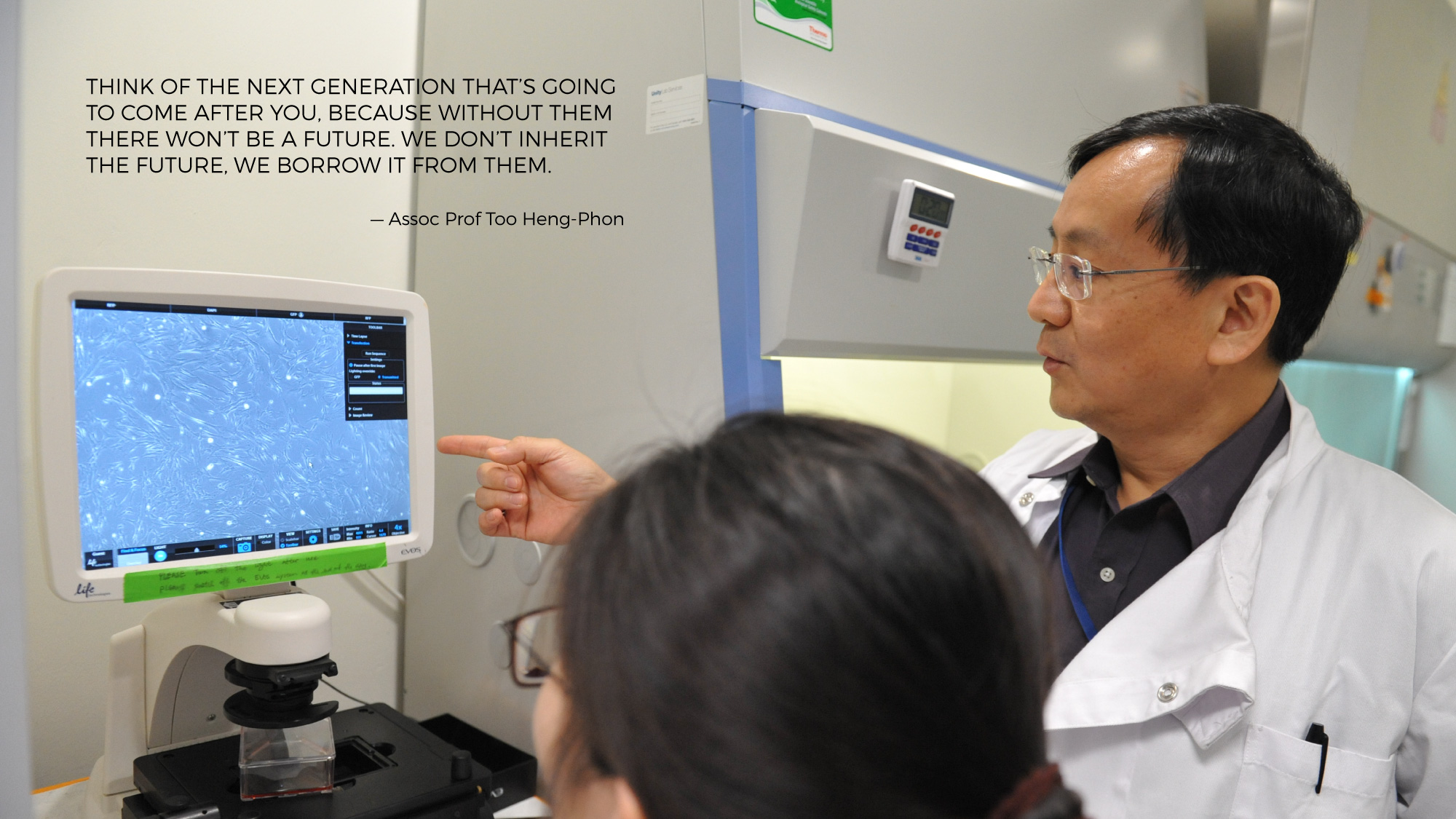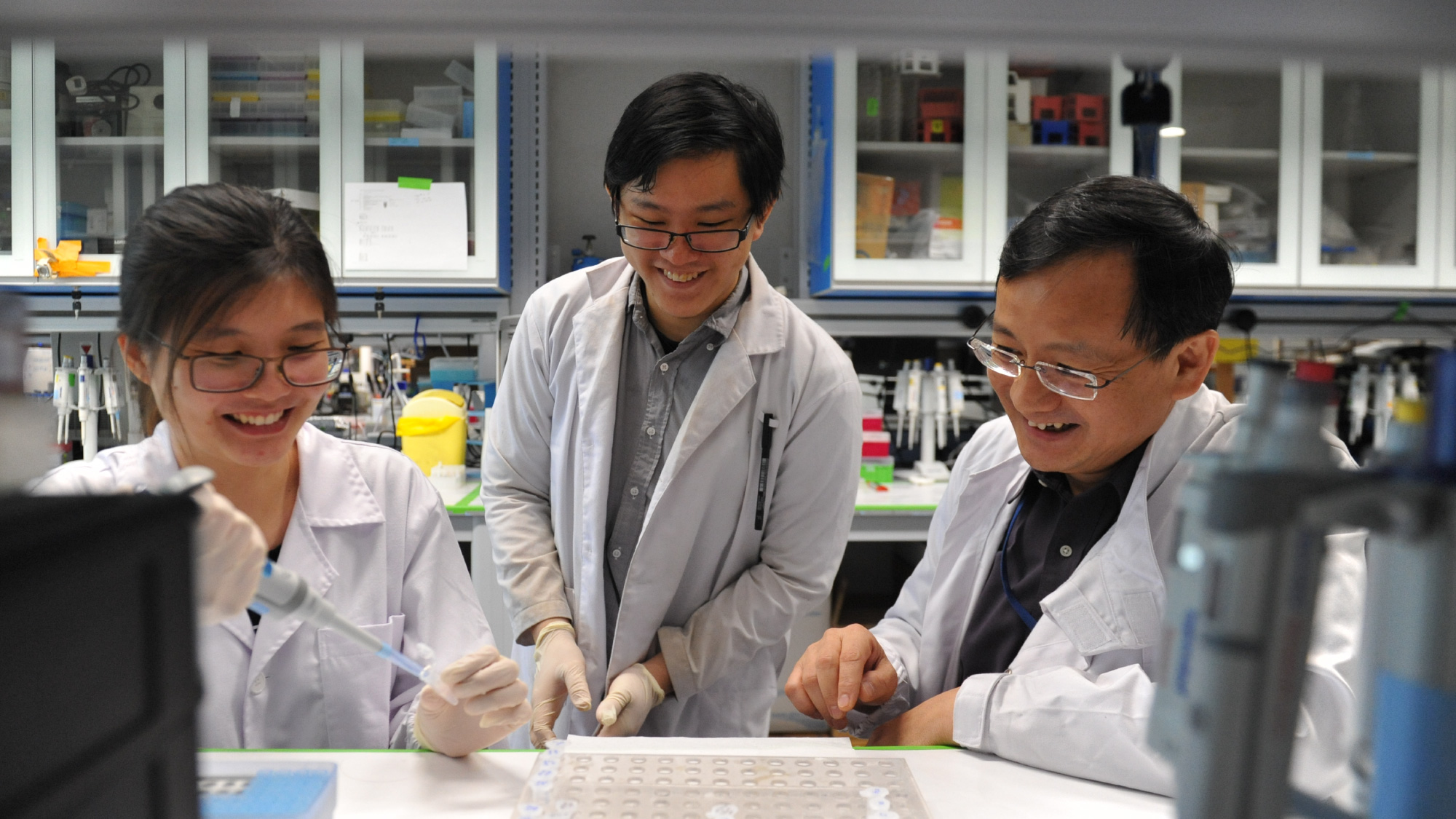The Warrior’s Way to Biotech Success
What does it take to nurture a biotech startup into an enterprise that is worth millions?
Patience and perseverance. And a good healthy dose of martial arts zen, according to Associate Professor Too Heng-Phon. “In karate, there is no first strike, but when you strike, you strike to kill. You wait for the right time, and you whack the guy once, that’s enough. So it’s the same thing when you want to do something right, go for the kill.” The man knows what he is talking about. The second dan karate black belter has plenty of scars from the long years of struggle, fighting to turn decades of scientific research into an extremely successful and uniquely Singaporean biomedical company. The firm, MiRXES, now employs more than 20 people and has also established a presence in China and in Harvard.
Measuring microrna in blood
In the 1990s, Assoc Prof Too started studying short segments of non-coding RNAs called microRNAs. Although made inside the cell, microRNAs can also be found outside the cell, in the blood. By affecting the expression of different genes, microRNAs is known to influence a wide range of biological functions, including the process by which normal cells change into cancer cells. Then, researchers started noticing that certain patterns of microRNAs in the blood corresponded to cancer (the levels of some microRNAs are consistently elevated, while others are consistently reduced), suggesting that measuring microRNAs could be a non-invasive alternative for detecting early cancer — a form of liquid biopsy. Surprisingly, given the notoriously unstable nature of RNA, these microRNAs are very stable in blood.
However, all was not smooth sailing. The methods that were being used to detect microRNAs in the blood were inconsistent and performed poorly. Assoc Prof Too and several of his PhD students at NUS Medicine’s Department of Biochemistry decided to develop a method to detect these microRNA patterns. After exploring different methods, they chose quantitative polymerase chain reaction (PCR) as the platform, which is a way to amplify and measure the amount of genetic material in a sample. Assoc Prof Too’s team proceeded to develop a method and with computational algorithms to analyse the large amount of microRNA data coming out of the PCR experiments.
“I am very stubborn. If I want to build something, by hook or by crook, I am going to make it work. And if it fails, then at least I’ve tried.”
Fresh hurdles and birth of mirxes
After developing a robust method that consistently performed well and then moving to venture into biomarker discovery, they realised that there was a need to set up a company to perform the assays and face the real world. That was where they ran into a fresh set of problems, and which would trouble the team for a number of years.
These would see Assoc Prof Too not being able to secure funding from any organisation to develop the technology further. At the nadir of his anguish, he was almost ready to leave Singapore for Hong Kong. But then funding finally came in one night in 2010. Exploit Technologies Pte Ltd (ETPL) at A*STAR agreed to fund the proof-of-concept for commercialisation for one year, and Assoc Prof Too was able to translate his research into a start-up company, MiRXES.
MiRXES produces diagnostic kits that can help doctors accurately detect, with a few drops of blood, whether a patient has developed gastric, breast, colorectal or lung cancer. This kit detects the patterns of microRNA — a type of gene — in a blood sample, and the results can be obtained within three hours.
The technology is beginning to be adopted in hospitals beyond our shores, Assoc Prof Too’s team is working with the Health Sciences Authority’s regulatory board to pave the way for the diagnostic kits to be used in local hospitals.
MiRXES was established by Assoc Prof Too and three of his PhD students. Today, they run the multimillion-dollar operation together with Assoc Prof Too, who works as a non-executive director to the local biotechnology start-up. MiRXES has also expanded from a four-man team, to a team of more than 30 employees globally.
Legacy and value creation
The teacher strongly believes in paving the way for the future generation.

“I share all my stuff with my students. Think of it, why do I need all these? I have already made it, so why bother? If the professors don’t help the next generation, how are they going to start rising? Somebody has to give them a start. My professors, my mentors, gave me a start. So similarly, everybody in the university should think that way. Think of the next generation that’s going to come after you, because without them there won’t be a future. We don’t inherit the future, we borrow it from them (the next generation).”
MiRXES has also ventured into Hangzhou, China, where Assoc Prof Too intends to recruit more staff to form a team of 30, up from the current team of eight staff members. His team is also working with Zhejiang Cancer Hospital on research into lung cancer.
“Hiring them (the Chinese) is easy, and they know much more than us. They work with China Food and Drug Administration, and the market there is huge. Those guys have an “everything can-do” attitude,” he says.
At the end of last year, MiRXES was named the “most promising start-up” in the Emerging Enterprise Award 2016. Success has brought suitors in the form of companies expressing interest to invest or buy stakes in the firm, whose difficult genesis is something its founder remembers and even celebrates.
The ‘S’ in the MiRXES stands for Singapore, he says, illustrating the importance of situating the company and performing the bulk of the work in Singapore, instead of selling the license to other companies for profit like many start-ups do.
“It is an easy way out for start-ups to give it away, to incubators, businessmen and multinational companies. But if you ever do that, you can never create value for Singapore.”
“The key reasons to set up a spin-off company are to save lives and to contribute to the ecosystem. Another reason for establishing a spin-off is to obtain funding beyond money coming in from grants, which is very unpredictable in Singapore.” However, setting up a company based on original research should “never be about making money” because, if such companies do one day produce a return on the money invested, that day could be a long time in the future. Beyond the possibility of turning a profit, Assoc Prof Too feels that spin-off companies are an important part of promoting innovation in Singapore and building a vibrant biotech culture here.
Karate’s philosophy
Back to the karate: outside of his teaching and research work, Assoc Prof Too dedicates three days each week to practising and teaching karate to both children and adults. He is also the vice-president of the Ken Yu Kai Karate Association Singapore.
“I practice karate for its philosophy. It is very important, every time you go into a karate class, you are humbled as you know that there are others better than you. In ‘kumite’, you block, you try to evade the onslaught of punches and kicks. This philosophy to me is very nice, and there is a deeper meaning to karate, it is how the underdogs can learn and rise to the top.”

The scientist-entrepreneur with his students.
